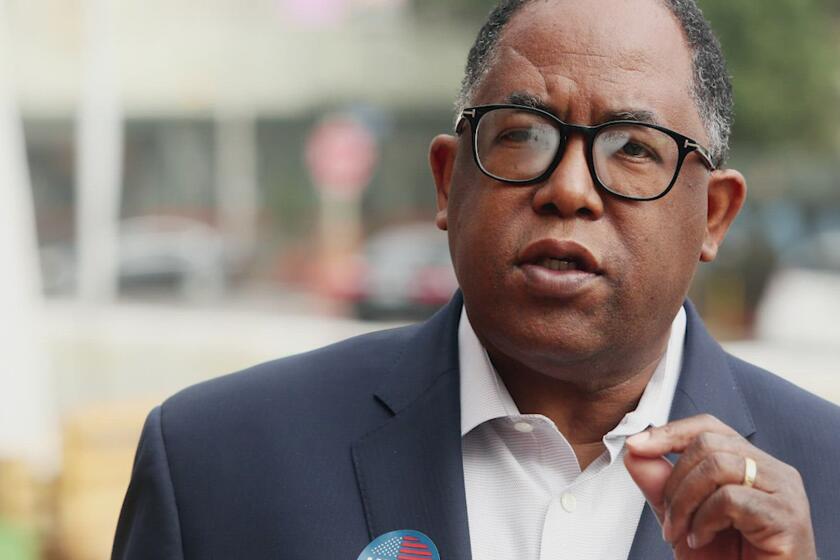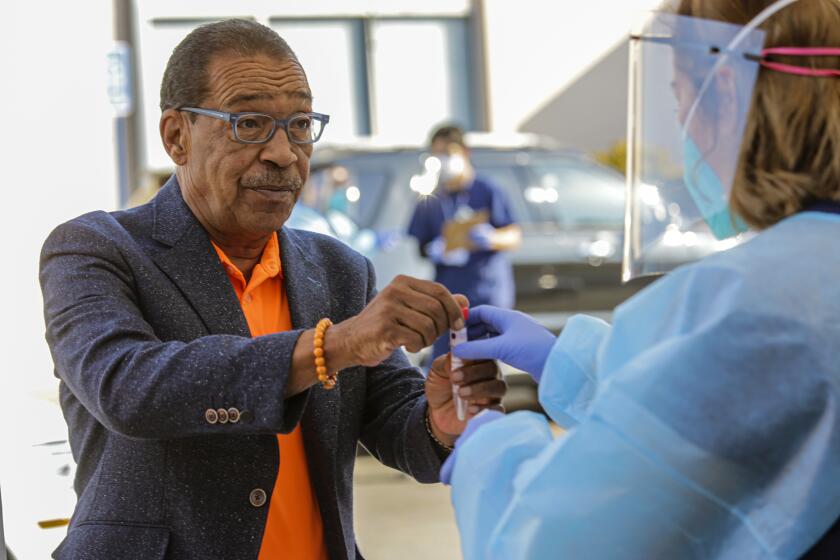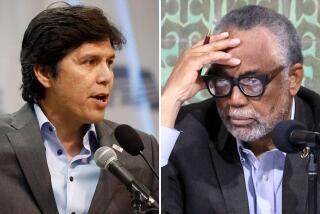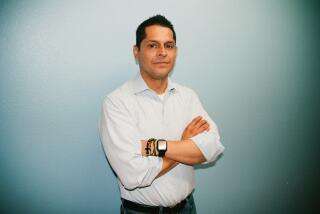Judge allows Herb Wesson to rejoin the L.A. City Council — at least for now
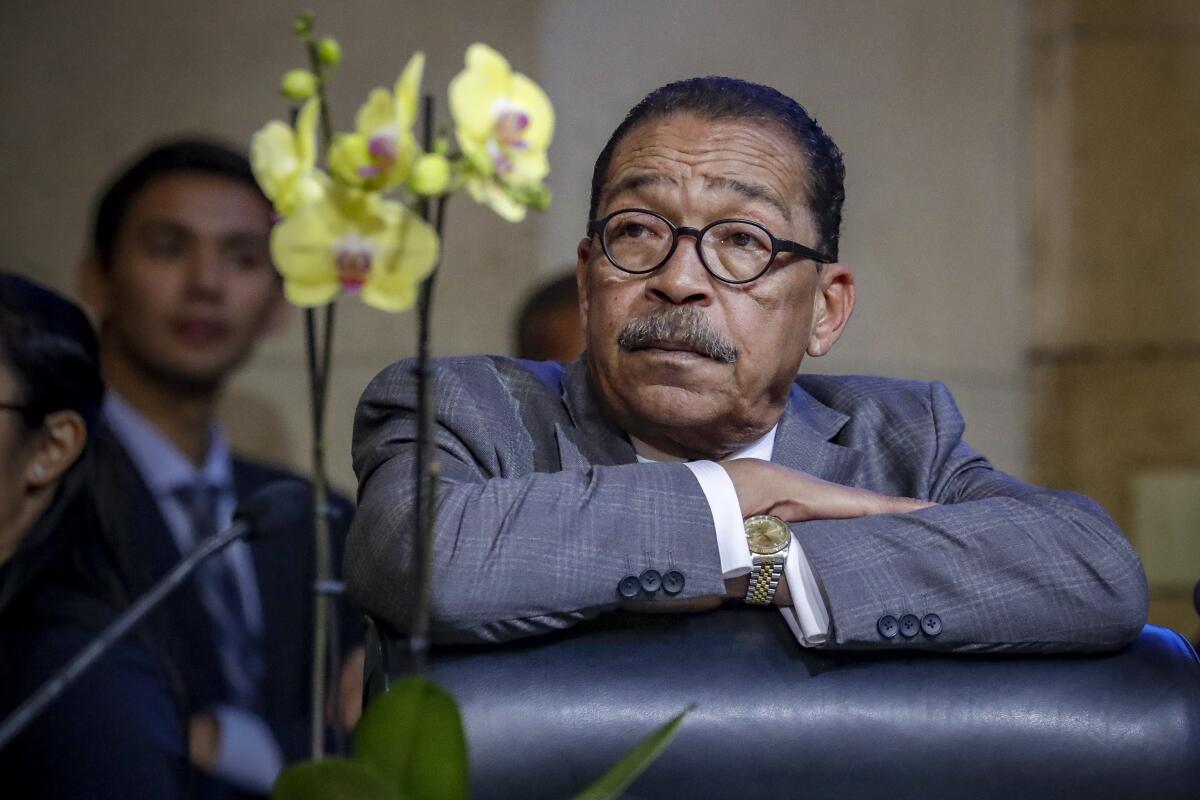
- Share via
A Superior Court judge has cleared the way for former Los Angeles City Councilman Herb Wesson to return to City Hall, at least for the time being, saying a civil rights group failed to follow the proper procedure for challenging Wesson’s appointment.
Judge Mary H. Strobel declined to rule Thursday on whether Wesson is legally eligible to come back as a temporary replacement for Councilman Mark Ridley-Thomas, who has been suspended and is fighting corruption charges.
Instead, she said the Southern Christian Leadership Conference of Southern California and other plaintiffs cannot directly seek a judge’s order removing Wesson without first seeking the sign-off of state Atty. Gen. Rob Bonta.
The lawsuit says the city’s term-limit law bars Wesson from holding the seat, since he has already served three full terms.
Strobel, who worked for the city attorney’s office from 1999 to 2002, dissolved the temporary restraining that she issued last month, which had barred Wesson from performing his council duties. She also denied the plaintiffs’ request for a preliminary injunction barring him from participating on the council.
The ruling provided one more sharp turn in the political journey of the city’s 10th District, which stretches from Koreatown to Leimert Park in South Los Angeles. Wesson, who served on the council from 2005-20, said after the hearing that he is pleased with the decision.
“Throughout this time, my only interest has been to serve my community,” he said. “This ruling allows us to focus on what matters most and that is bringing the community together and making sure the people of the 10th District have representation.”
Prosecutors have accused Ridley-Thomas of conspiring with a USC dean to steer county contracts to the university. In exchange, Ridley-Thomas’ son, Sebastian, was admitted to USC’s graduate school and given a full-tuition scholarship and a paid professorship, prosecutors said in their 20-count indictment.
The council responded to the indictment by suspending Ridley-Thomas, leaving the district with a nonvoting caretaker. Residents of the district said that move left them without political representation, effectively disenfranchising them.
The council voted last month to appoint Wesson as a temporary voting member, assigning him to fill Ridley-Thomas’ seat until no later than Dec. 31. Council members specified that Wesson would leave earlier if the charges against Ridley-Thomas are dropped or he is acquitted.
The SCLC of Southern California, along with several voters in Ridley-Thomas’ district, filed a lawsuit challenging that decision, arguing that the city’s term limit law prohibits Wesson from rejoining the council. Strobel issued her order days later, blocking Wesson from participating as a council member, handing a victory to the plaintiffs and setting the stage for Thursday’s hearing.
Asked about the ruling, council President Nury Martinez said 10th District residents “overwhelmingly suggested” that he fill the seat.
“The judge previously ruled that the council absolutely had the authority to suspend council member Ridley-Thomas, and today she denied the petitioners’ request to prevent Mr. Wesson from serving as council member for the 10th District,” she said. “The people of the 10th deserve a vote on this council and today we gave that to them.”
During the hearing, lawyers for the SCLC of Southern California argued that letting Wesson fill the seat would cause “irreparable harm” to the district. The attorney general’s office could take months to determine whether to support the challenge against Wesson — and ultimately decide not to, said attorney Crystal Nix-Hines.
The proposal comes four months after the City Council suspended Mark Ridley-Thomas, who is fighting corruption charges.
In the interim, she said, Wesson could make major spending and staffing decisions. “He could fire all of Councilman Mark Ridley-Thomas’ staff tomorrow,” she said.
A spokesman for City Atty. Mike Feuer declined comment. In their legal filings, the city’s lawyers argued that any challenge to Wesson’s ability to serve in public office requires a “quo warranto” action, which requires the consent or involvement of the attorney general.
Lawyers for the city said the appointment of Wesson would provide the district with a temporary voting member while also establishing a process for Ridley-Thomas to return if he is cleared of the charges.
An attorney for Ridley-Thomas had a less favorable view, saying voters are being “deprived of their rights of democratic representation.”
“Mark Ridley-Thomas’s chief concern is for those voters and those rights,” said attorney Michael J. Proctor.
Attorney John Sweeney, who also represents the SCLC of Southern California, said he did not consider the ruling to be a defeat, since the judge did not take up the question of Wesson’s eligibility. He said his clients plan to inform the attorney general’s office about their challenge.
“This will be back before this judge in very short order,” he said.
More to Read
Sign up for Essential California
The most important California stories and recommendations in your inbox every morning.
You may occasionally receive promotional content from the Los Angeles Times.
